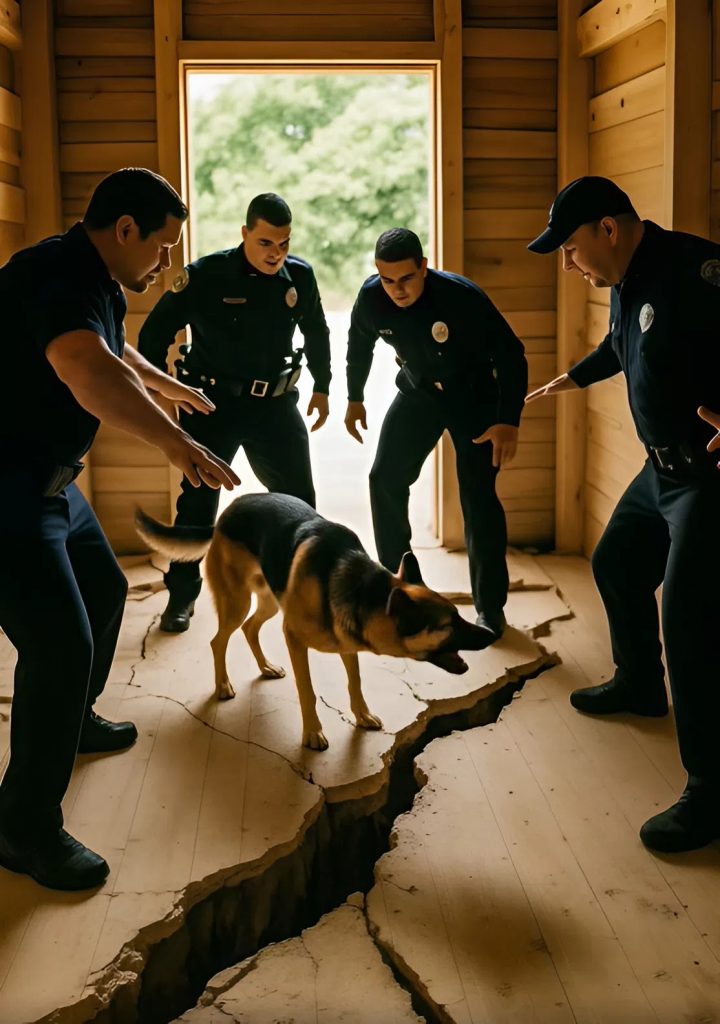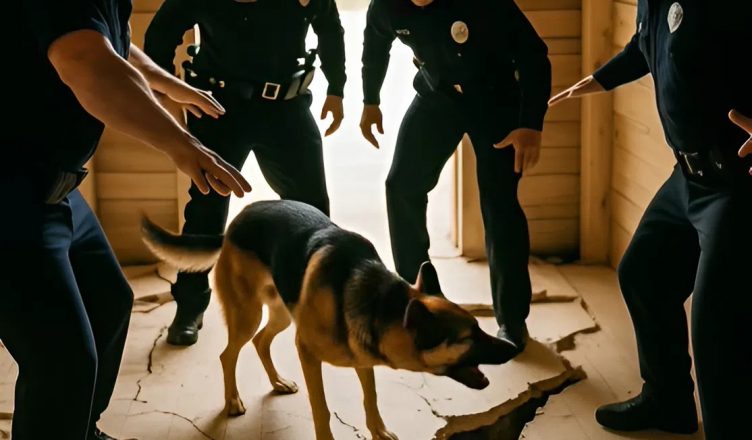The call came in the middle of a quiet evening at the local police station. The voice on the other end was shaky, urgent. A man claimed he had heard strange noises coming from the abandoned house next door — low, muffled sounds, like moaning or scratching. He couldn’t say exactly what it was, but he was adamant: “Something’s wrong over there. Please, send someone.”
It was the kind of call that could have been brushed off as a prank, or paranoia. But the officers decided to check it out. Within minutes, a patrol unit was dispatched, accompanied by a German shepherd named Gray — a seasoned police dog known for his sharp instincts.
The house in question sat on the outskirts of the city, in a forgotten neighborhood where time seemed to have stopped. The street was lined with homes that had long since emptied out — doors hanging open, paint peeling, silence thick in the air. The house the caller mentioned had a reputation. It had been empty for years. No lights, no signs of life. Just a sagging fence, boarded windows, and a collapsing roof.
But when the officers stepped inside, they realized something was very wrong.
The air was stale, heavy with dust and decay. Floorboards creaked under their feet. The walls were discolored, mold creeping across the corners. But it was the living room that drew their attention — or more specifically, what was left of it. Most of the floor had caved in. In the center yawned a deep, black pit, like a wound in the earth. The boards surrounding it were splintered, fragile.
Gray, the dog, froze. Then he growled. Then barked — loud, desperate, insistent. He ran to the edge of the pit and began clawing at the floor. He would not look away from the hole.
One of the officers, a veteran named Andrey, approached slowly. He pulled out his flashlight and leaned over the jagged opening. As the beam of light pierced the darkness, he drew back sharply, face pale. “Call it in,” he whispered. “Now.”
At the bottom of the pit, partially buried in soil and debris, was a body.

But it wasn’t just a skeleton. No — it was preserved in a grotesque, mummified state. The arms were twisted unnaturally, the skin dry and gray. The expression on the face was one of pure terror, frozen in time. Around the body were rusted shackles, metal chains, and what looked like crude tools — the kind not meant for construction, but for restraint. Or worse.
The scene was immediately secured, and a forensic team was called. As the body was carefully retrieved, investigators began piecing together a horrifying timeline. The man had died more than five years ago. Cause of death: starvation and dehydration. In other words, he had been trapped. Left to die, slowly.
Neighbors began to talk.
One elderly resident remembered that years ago, a man named Nikolai had lived in that house. A strange, reclusive man. People rarely saw him. He had a brother, too — at least, that’s what was whispered. A quiet, withdrawn man who suddenly disappeared without a trace. Everyone assumed he’d left town.
He hadn’t.
As the investigation continued, police uncovered what they believe to be a secret underground chamber — possibly a remnant from older times, a forgotten root cellar or bunker. Nikolai had reinforced it, sealed it off, and — for reasons no one yet fully understands — imprisoned his own brother inside.
Then, years later, Nikolai died suddenly of a heart attack. The house stood untouched. Silent. No one entered. No one knew.
Until one night, a sound escaped. A sound that, by all logic, shouldn’t have been possible.
The case has shocked the entire city. People ask the same questions over and over: Why would someone do this? How did no one hear anything? Could it have been prevented?
Some say the house is cursed. Others believe it holds more secrets still buried beneath its crumbling foundation.
One thing is certain: this was no ordinary abandoned home. It was a tomb. A prison. A place where silence covered up one of the most haunting crimes in recent memory.
And if not for a single dog’s instinct — and one neighbor who refused to ignore what he heard — the truth might have stayed buried forever.
